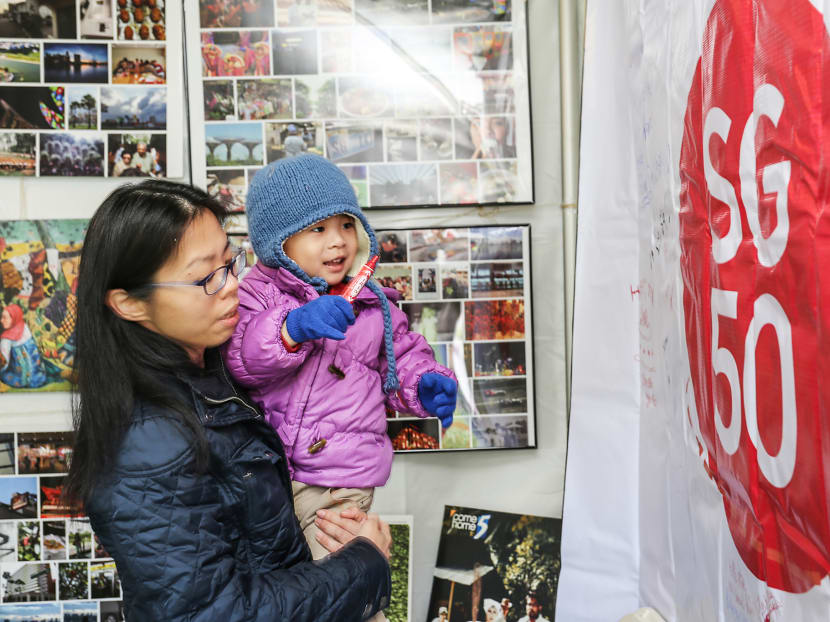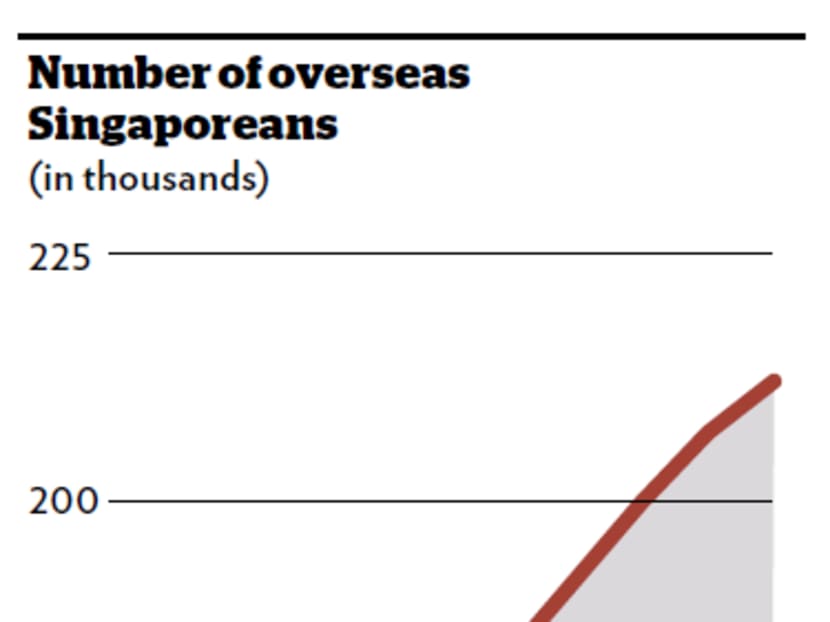The Big Read: More S’poreans overseas, but brain drain concerns dissipate
SINGAPORE — While much attention of late has been focused on the inflow of foreigners to the Republic’s shores, its diaspora has been steadily growing year on year: As of last year, 212,000 Singaporeans were living overseas, compared with 157,800 in 2004, increasing by more than a third over the past decade.


SINGAPORE — While much attention of late has been focused on the inflow of foreigners to the Republic’s shores, its diaspora has been steadily growing year on year: As of last year, 212,000 Singaporeans were living overseas, compared with 157,800 in 2004, increasing by more than a third over the past decade.
However, given the effects of globalisation, increased mobility of people around the world and Singapore’s status as a city state, the trend is inevitable, experts said.
Institute of Policy Studies senior research fellow Leong Chan Hoong noted that overseas Singaporeans make up about 6 per cent of the island’s citizen population. While the proportion is higher than those of developed economies such as Australia and the United States, Dr Leong said: “Relatively speaking, I don’t think it’s a figure that we should be overly alarmed by, given that we are a city state.”
Still, the Republic’s leaders have, from time to time, voiced concerns about a potential brain drain and the need for a greater sense of belonging.
In 2008, for example, Prime Minister Lee Hsien Loong revealed that about a quarter of top A-level students who had gone abroad to study or work did not return. In 2002, then Prime Minister Goh Chok Tong said he was saddened by a report in the now-defunct Streats newspaper, in which some young Singaporeans said they would “run at the drop of a hat” or felt “no sense of belonging here”. “These people are fair-weather Singaporeans ... I call them quitters,” he said.
But the tide appears to be changing, due partly to the lacklustre economies of the United States and European countries – resulting in a lack of job opportunities and prospects – which are traditionally popular with Singaporeans looking to settle overseas. In comparison, Singapore offers relative economic stability, despite its moderating growth, economists said. And this could lure overseas Singaporeans back, they added. “Particularly in countries where the unemployment is quite high still,” said UOB economist Francis Tan.
In some instances, the sluggish economic conditions in several countries have led to locals becoming less welcoming of foreigners, overseas Singaporeans told TODAY.
Other factors include the rise of social media which has helped those overseas stay in touch not just with friends and loved ones but also with the happenings in the country. Government agencies such as the Overseas Singaporean Unit (OSU) and Contact Singapore have also increased their outreach efforts.
The OSU, set up in 2006, “plans and coordinates a whole-of-government effort to engage overseas Singaporeans to keep them emotionally connected to Singapore”, according to its website. Contact Singapore was started in 2008 as an alliance between the Manpower Ministry and the Economic Development Board to engage overseas Singaporeans and global talent to work, invest and live here.
Out of the 20 overseas Singaporeans TODAY interviewed for this report, three said they have decided to settle abroad and not return to the Republic. Nine indicated that they wish to come back, while eight have yet to make a decision. Ms Lin Hui-Yi , 34, who left Singapore for Beijing in 2008 for work, said that being in a foreign environment has challenged her to expand her horizons. “When I decided to come to Beijing, it was like taking a plunge into something rather unknown,” said Ms Lin, Head (China Research Operations) at Grail Research. But Singapore is “still home” and she will return eventually because of her family, she said.
Ms Melissa Tsang, 23, who left Singapore in 2009 to read Architecture in the University of Melbourne, also said she will come back after gaining some work experience overseas. “Singapore is…where I am from and where I would like to settle down in the future with my family,” she said.
LEAVING THE NEST, STAYING ROOTED
For those who have decided to sink their roots outside of Singapore, it was a combination of push and pull factors. Mr Shaun Lim, 30, who moved to Silicon Valley to work at PayPal after graduating from the National University of Singapore in 2010, said that the engineering jobs in the Republic were “not of the same quality” as those in Silicon Valley. “They don’t pay quite as well either,” the software engineer added.
A less hectic pace of life and the vast space that bigger countries offer have also been common reasons cited by Singaporeans who have relocated overseas permanently. However, overseas Singaporeans said there are drawbacks and challenges too when seeking to earn a living or raise a family overseas.
Mr Edmund Fong, who left for Melbourne in 2007 and became a permanent resident there, does not regret the choice he made. But the 36-year-old oil and gas engineer said: “Just as a lot of Singaporeans complain about foreigners in Singapore, keep that in mind when you are overseas.”
Ms Balvinder Sandhu, 41, a freelance writer who migrated to Melbourne in 2008 to join her husband there, added: “The grass is not always greener on the other side…so don’t think that because you lived overseas as a student for a few years and loved it, you would love working overseas the same too.”
Thanks to social media and a growing diaspora, overseas Singaporeans are able to keep their bonds with the country strong.
Mr Win Soon 21, a first-year undergraduate at Rice University in the United States, keeps up to date with current affairs and happenings in Singapore via news websites. Every week, he would call his friends and family using Skype.
Overseas student organisations for Singaporeans are also doing their part. Singapore Students’ Association (Beijing) President Tan Siyuan said that it holds about 10 events annually for Singaporeans including a meet-up with freshmen in Singapore to prepare them for college life in China. The Singapore Students’ Association of Germany said it holds two major events – including a weekend gathering - in each academic year.
Imperial College Singapore Society in London said it is commemorating the Republic’s jubilee year in its annual stage production. Its president Clive Aw said: “This year, we have tied in the script with SG50 to allow Singaporeans overseas to join in the celebration as well.”
Last month, Singaporeans in San Francisco and neighbouring cities marked SG50 at the inaugural Singapore Community Day. The ground-up initiative was organised by SingaporeConnect, a Singaporean community group in Silicon Valley. Supported by the OSU, the event was attended by more than 700 Singaporeans and their families.
BRINGING S’POREANS BACK
National University of Singapore (NUS) sociologist Paulin Straughan noted that brain drain was a bigger concern for Singapore in the past. But as globalisation gathers pace, it has become less of an issue because it is no longer one-way traffic and the net effect is negligible. “Just as we send our own people overseas, we also receive talent from other countries,” she said.
Another NUS sociologist, Professor Tan Ern Ser, said while it is not necessary for policymakers to try and keep Singaporeans in Singapore, they should ensure that there are good jobs for Singaporeans here. “The exposure overseas may actually be a good thing… (and it will) be quite valuable,” he added.
Singapore Management University law don Eugene Tan said that in the global war for talent, Singaporeans who are well-educated or have special skills are very much in demand. This is why the Republic has sought to engage overseas Singaporeans “a lot more conscientiously” over the past decade, he said. “The growing Singapore ‘diaspora’ could constitute, simultaneously, a talent leakage and a valuable external economic wing and network,” he said. “The policy imperative is to ensure they maintain strong bonds with Singapore.”
Responding to TODAY’s queries, an OSU spokesperson said globalisation and an increasingly educated population that is able to seize employment and growth opportunities play a part in the growing number of overseas Singaporeans. The spokesperson said that the OSU is continually engaging Singaporeans studying and working abroad through programmes and initiatives such as the Singapore Speakers’ Series, Camp@Home which is a non-residential camp held here for Singaporean children living overseas, and the annual Singapore Day.
Singapore Day last year was held in London. Drawing some 9,000 overseas Singaporeans, the event featured hawker fare and booths showcasing developments in Singapore. This year’s Singapore Day will take place next month in Shanghai.
Some government agencies are also trying to woo overseas Singaporeans back, with the country facing a manpower crunch in many sectors as it weans itself off imported labour.
For example, the Ministry of Health had previously announced that it has put in place measures to encourage more overseas-trained Singaporean medical doctors to return to Singapore. Top Singaporean scientists working overseas have also been encouraged to come back, with the lure of full funding support for research work and help in setting up laboratories at universities here.
While there has been a significant spike in labour force participation among women and older workers in recent years, Singapore’s workforce is expected to shrink in the medium to long term. Policymakers have repeatedly voiced concerns about the impact of an ageing population on the dependency ratio of working age adults to elderly.
Robert Walters Singapore Managing Director Toby Fowlston said there has been a “big push” from both the private and public sectors to bring overseas Singaporeans back into the local workforce. “Due to their local knowledge as well as international exposure, there is a demand for overseas Singaporeans from hiring managers in Singapore,” he added. His firm is leveraging on its international network of offices to build an overseas Singaporean database of more than 2,000 professionals.
For overseas Singaporeans, there are many factors to consider as to when and if they return to their homeland – especially when much thought had already given to the decision to take the plunge and relocate abroad. But based on the interviews with some of them, the quality of life – particularly during old age – is a significant consideration. Mr Anil Nair, a 37-year-old strategic development manager, moved to Australia in 2001 and became a permanent resident. He is unsure whether to return eventually. “A lot will depend on what sort of lifestyle I and my wife might be able to lead as retirees in Singapore,” he said.






